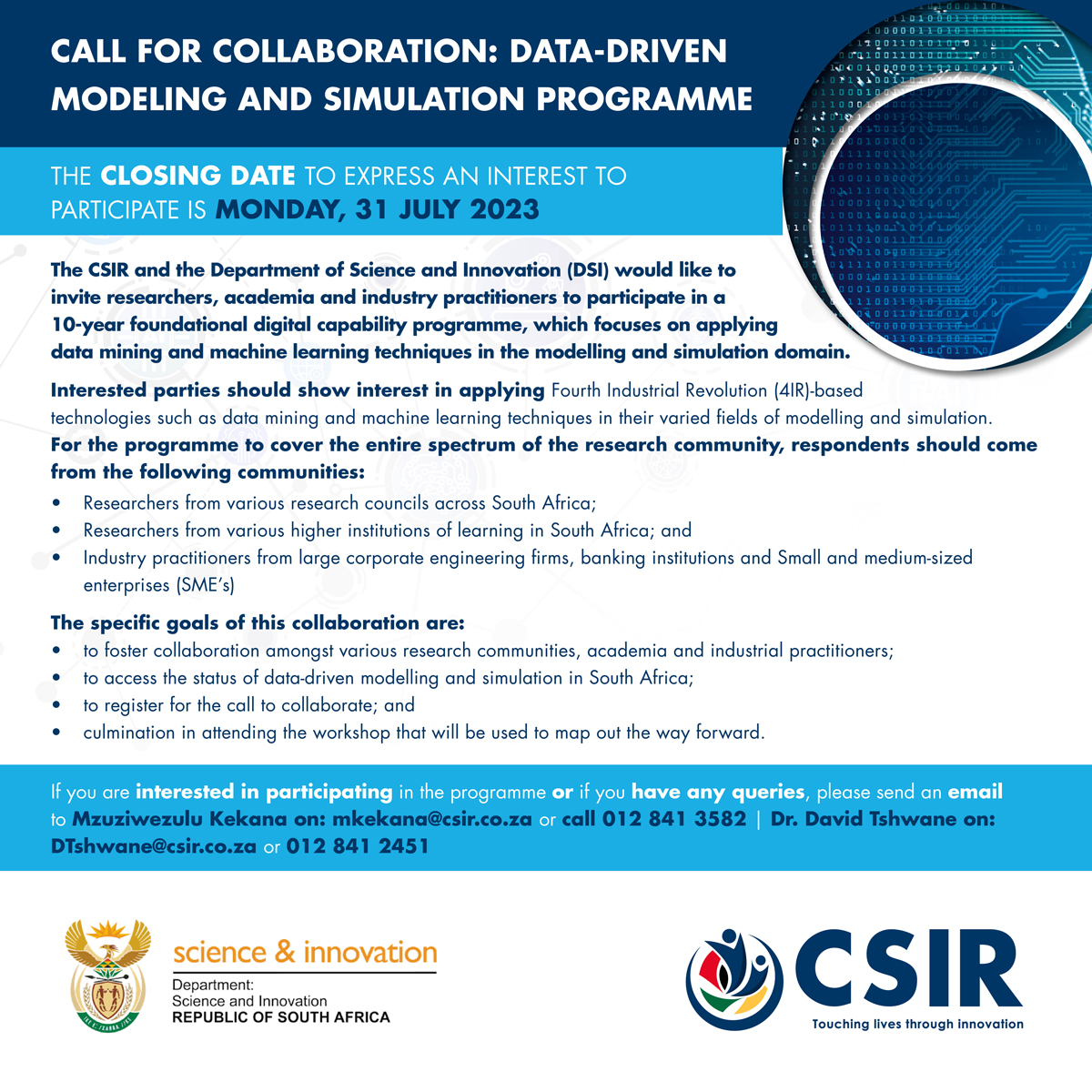Advanced Search
Search Results
The primary function of the Water Research Commission (WRC) is to promote coordination, cooperation and communication in the area of water research, to establish water research needs and priorities, stimulate and fund water research according to priority, promote the effective transfer of information and technology and enhance knowledge and capacity building within the water sector.
On Monday, 19 June 2023, South African climate change experts, led by Extreme Climate Events Research Alliance, a platform for the research community, will host the El Niño 2023 Summit to share information on this pending climate anomaly with the general public and industries, businesses, government departments and other stakeholders who will most likely be impacted by El Niño.
The CSIR Air and Dust Laboratory specialises in the analysis of environmental air quality through, for example, the occupational hygiene filters of mine employees.
The CSIR Air and Dust Laboratory specialises in the analysis of environmental air quality through, for example, the occupational hygiene filters of mine employees.
The CSIR launched the African Bio-manufacturing Workforce Development and Training Programme in June 2023.
The pilot site of the Learning Factory (LF) was established in March 2021 at the CSIR campus in Pretoria.
The CSIR’s passenger transport research focus is on creating a competitive transport industry and improving safety and access in this industry, as well as localising public transport technologies.
The CSIR’s Detonics, ballistics and explosives laboratory (DBEL) is a uniquely equipped facility, outside of the City of Tshwane, where experimentation is conducted to determine the impact of blast
Water Research Centre
Overview
The CSIR Water Research Centre contributes to the provision of reliable, efficient and functional water and wastewater service delivery, in the interest of economic development, through the development and refinement of smart water use and infrastructure technologies for the public and private sectors.
The centre addresses shortcomings in South Africa’s water planning and accountability; infrastructure operation and maintenance; water treatment technologies and critical domain skills. It also focuses on dwindling water resources, deteriorating water quality, emerging water pollutants and lack of access to alternative water resources.
Strategic objectives
The CSIR invests in the development of technology/software/tools that will improve water resources resilience, thus ensuring availability of water of high quality against the backdrop of the impact of climate change and other stressors, such as trade-offs within the food-water-energy nexus.
The organisation helps improve water management systems through its contributions towards policy reviews and the development of tools and techniques that will reduce the cost of water delivery and promote equitable water use. The aim is to ensure improved water testing methods, purification, water and wastewater treatment, and access to alternative water resources.
The CSIR Water Research Centre also contributes towards scarce skills development (human capital development) in the water sector through bursary and internship programmes.
Researchers aim to develop fit-for-purpose technologies for the development and optimisation of smart and robust water use and wastewater infrastructure with concomitant improved operation and maintenance.
Offerings
Smart water use: Provide knowledge, innovation, skills and services to improve water supply and demand management through effective water resources planning. This also includes improved assessment and testing of water resources, pathways and effluents, and the development of low-cost technology solutions to mitigate water quality challenges.
Smart water infrastructure: Develop comprehensive water infrastructure lifecycle solutions (design, operation and performance management) with a specific focus on raw water reticulation, potable water distribution network, wastewater distribution networks, and water and wastewater treatment plants.
Selected interventions and technologies
Potable water network management through smart systems
Challenge: Dilapidated and poorly operated water supply infrastructure contributing to poor service and non-revenue water.
Solution: (Near) Real-time water distribution network data acquisition with automated analysis and response for enhanced operation and maintenance.
- Smart pressure management system
- Continuous leak detection
- Show stresses on the network
- Smart water metering
- Overview of network performance
- Smart water quality monitoring tools
Decentralised wastewater treatment systems to augment centralised wastewater treatment plants with circular economy benefit
Challenge: Water supply and sanitation backlogs, due to lack of sufficient infrastructure funding, among others.
Solution: Low energy demand and chemical-free water purification and supply, as well as wastewater treatment decentralised systems.
- Low capital expenditure;
- Low operating expenditure; and
- Ease of deployment
Taking advantage of the fourth industrial revolution for development of advanced technologies for water resources management for different users
Challenge: Lack of innovative and effective water data collection, storage and use.
Solution: A National Centralised Water Data Repository that would be easy to access, generate and extract valuable information from in support of water security, economic growth; and
Refine existing tools and develop new tailor-made tools and software to support decision making in water management and planning.



